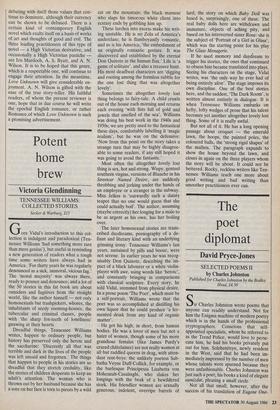Potent home brew
Victoria Glendinning TENNESSEE WILLIAMS: COLLECTED STORIES
Secker & Warburg, £15
Gore Vidal's introduction to this col- lection is indulgent and paradoxical (Ten- nessee Williams 'had something more rare than mere genius'), but useful in reminding a new generation of readers what a tough time some writers have always had in America. 'For thirty years he was regularly denounced as a sick, immoral, vicious fag.' The 'moral majority' was always there, ready to pounce and denounce; and a lot of the 50 stories in this fat book are about outsiders and fugitives from the straight world, like the author himself — not only homosexuals but trashpickers, whores, the inhabitants of seedy rooming-houses, the tubercular and criminal classes, people with 'the sharp fox-teeth of loneliness' gnawing at their hearts.
Dreadful things, Tennessee Williams writes, happen to ordinary people, but history has preserved only the heroic and the saccharine: 'Discreetly all that was terrible and dark in the lives of the people was left unsaid and forgotten.' The things that happen to people in his stories are so dreadful that they stretch credulity, like the stories of children desperate to keep an adult's attention. The woman who is thrown out by her husband because she has a sore on her face is torn to pieces by a wild cat on the mountain; the black masseur who slaps his timorous white client into ecstasy ends by gobbling him up.
These lurches into excess make his writ- ing unstable. He is no Zola of America's underclass; he is flamboyantly romantic, and so is his America, 'the embodiment of an originally romantic gesture. It was discovered and established by the eternal Don Quixote in the human flux.' Life is 'a game of solitaire', and also a treasure hunt. His most deadbeat characters are 'digging and rooting among the formless rubble for the one lost thing that was altogether lovely'. Sometimes the altogether lovely lost thing belongs to fairy-tale. A child crawls out of the house each morning and returns each evening 'with fists full of gold and jewels that smelled of the sea'. Williams was doing his best work in the 1940s and 1950s; we are pretty used to the fantastical these days, comfortably labelling it 'magic realism', but he was on the defensive: `Now from this point on the story takes a strange turn that may be highly disagree- able to some readers, if any still hoped it was going to avoid the fantastic.' Most often the altogether lovely lost thing is sex, hot and strong. Wispy, genteel southern virgins, versions of Blanche in his Streetcar Named Desire, are suddenly throbbing and jerking under the hands of an employee or a stranger in the subway. Miss Jelkes is 'outwardly such a dainty teapot that no one would guess that she could actually boil'. The author, assuming (maybe correctly) her longing for a male to be as urgent as his own, has her boiling over.
The later homosexual stories are trans- cribed daydreams, pornography of a de- fiant and literary kind with an underlying grinning irony. Tennessee Williams's last years, sustained by pills and booze, were not serene. In earlier years he was recog- nisably Don Quixote, describing the im- pact of a black labourer or a white violin- player with awe, using words like 'heroic', and constantly bringing in comparisons with classical sculpture. Every story, he told Vidal, stemmed from physical desire. In a prose poem 'The Poet', which must be a self-portrait, Williams wrote that the poet was so accomplished at distilling his own liquor that he could produce 'a fer- mented drink from any kind of organic matter'.
He got his high, in short, from human bodies. He was a lover of men but not a hater of women, though some of his more grandiose females (like James Purdy's crazed chatelaines) are not really women at all but raddled queens in drag, with atten- dant rent-boys: the unlikely poetess Sab- batha Veyne Duff-Collick, for example, or the burlesque Principessa Lisabetta von Hohenzalt-Casalinghi, who slakes her longings with the beak of a bewildered stork. His friendlier women are sexually generous, indolent, overripe barrels of lard; the story on which Baby Doll was based is,. surprisingly, one of these. The real baby dolls here are withdrawn and immature, objects of aching pity, and based on his introverted sister Rose: she is the subject of 'Portrait of a Girl in Glass', which was the starting point for his play The Glass Menagerie. If he used memory and daydream to trigger his stories, the ones that continued to obsess him became translated into plays. Seeing his characters on the stage, Vidal writes, was 'the only way he ever had of being entirely alive'. The stage imposes its own discipline. One of the best stories here, and the saddest, 'The Dark Room', is written almost entirely in dialogue. It is when Tennessee Williams embarks on hefty, lofty wedges of prose that his talent becomes yet another altogether lovely lost thing. Some of it is really awful.
But not all of it. He has a long opening passage about croquet — the emerald lawn, the hoops, the painted poles, the coloured balls, the 'strong rigid shapes' of the mallets. The paragraph expands to show the house beyond the lawn, and closes in again on the three players whom the story will be about. It could not be bettered. Rocky, reckless writers like Ten- nessee Williams teach one more about good writing and bad writing than smoother practitioners ever can.








































 Previous page
Previous page